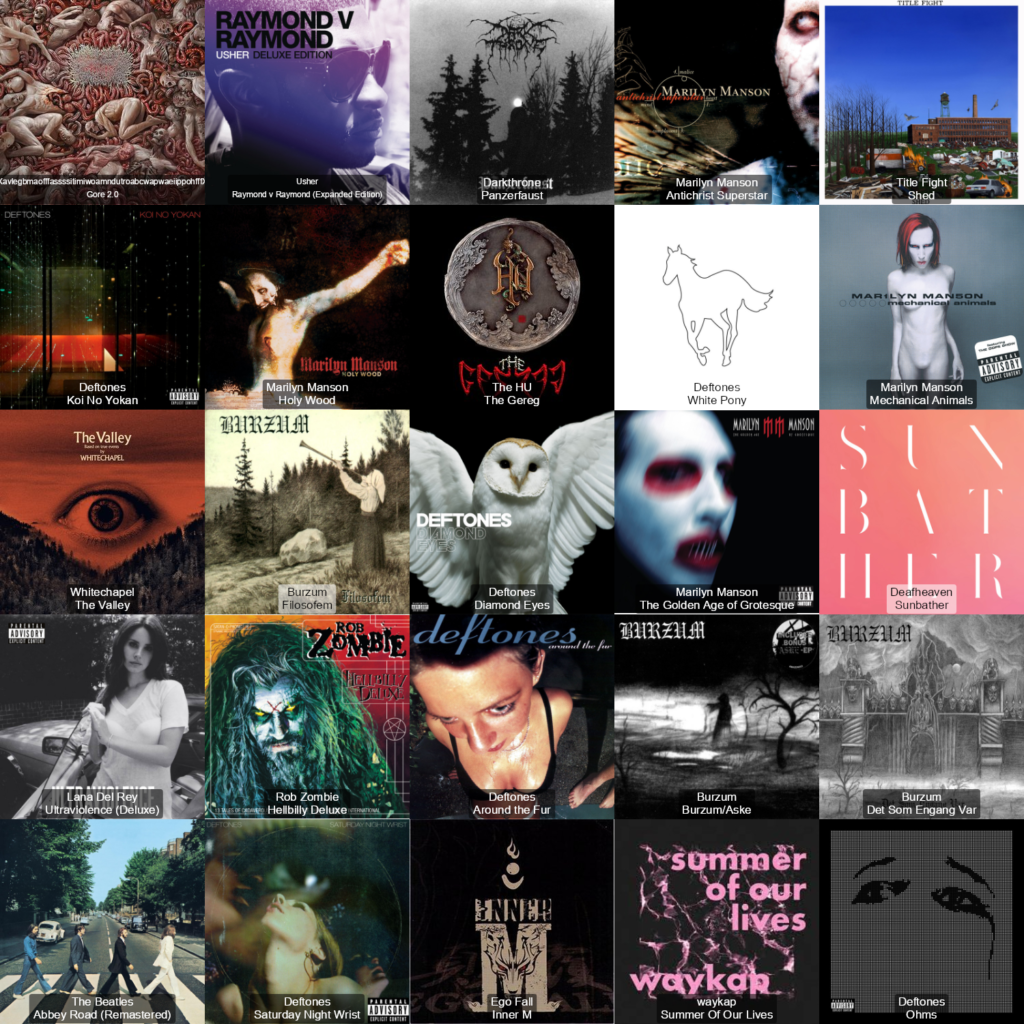For most of my life, my Spotify playlists have been pretty standard. I started off in middle school listening to EDM, quickly moving onto Queen and other old-school rock bands recommended by my dad. I generally didn’t put too much thought into what I was listening to: Whatever song had the highest stream count sounded the best to me. I didn’t even know what an album was, much less the concept of listening to an album from front to back like artists intend.
In 2021, I discovered Kanye West due to the commotion surrounding the release of his album “Donda.” Coincidentally, I had recently been given a pair of AirPods. From then on, I would almost exclusively listen to West, first going through his greatest hits but eventually learning to listen through his albums one by one. I gained an appreciation for his bold experimentation through the years, from the charming soul sampling of his first two albums “The College Dropout” (2004) and “Late Registration” (2005) to the industrial grind of “Yeezus” (2013) and the electronic-gospel music of “Donda.”
However, 10,000 streams later, I grew tired of West. As of now, I’ve listened to 35 of his songs 100 or more times each, with the top song — “Devil In A New Dress” — currently at 269 all-time streams. Since that song has a 5:51 runtime, that means I’ve listened to it for over 26 hours total. I was desperately looking for new music to listen to.
“Yeezus” is the one album of his that I continued to enjoy after mostly quitting listening to rap music in late 2023. I enjoyed its raucous, electronic production and West’s defiant lyrics and sought music that resembled it. By chance, I managed to stumble upon the bands Rammstein and Marilyn Manson. I immediately realized metal was the genre I’d been looking for all along. Although I quickly got tired of Rammstein (after a few dozen streams, their music had a somewhat consumerist feel), Marilyn Manson stuck with me.
At this point, my tastes were still fairly basic, so Marilyn Manson’s catchy riffs helped me bridge the mental gap to more extreme genres. The first track of their second, most popular album “Antichrist Superstar” (1996), a frenetic anthem titled “Irresponsible Hate Anthem,” immediately grabs the listener’s attention with its pounding drums and Manson’s acidic, gleefully hateful lyrics: “Let’s just kill everyone and let your God sort them out!”
This quote was originally attributed to a Catholic abbott who ordered both believers and heretics to be put to death at the Massacre at Béziers in 1209 during the Crusades. The lyric by itself obviously fits a song titled “Irresponsible Hate Anthem,” but to those with background knowledge, it becomes a mockery of resignation toward finding meaning in life on Earth and blind belief that justice will be served in the afterlife.
Similarly, the song “Get Your Gunn” (1994) on Manson’s previous album is about the real-life murder of OB-GYN Dr. David Gunn by a Christian anti-abortion activist, and the clear irony of someone who is supposedly “pro-life” being willing to kill to achieve his ends. Though these lyrics may seem senselessly violent to the unacquainted, they are in reality fascinating time capsules showing the youth’s frustration at a society controlled by the hypocritical religious right.
Manson never lets go of the listener’s attention with other standout tracks like the creepy, seductive and flamboyant “Deformography” and “1996,” which somehow tops “Irresponsible Hate Anthem” with pure unadulterated hatred. Tying the diverse musical experimentation throughout the album are the story-driven lyrics, detailing the growth of a boy into a supernatural deity that brings Hell on Earth.
In the time between my first listen-throughs of “Antichrist Superstar” and the other Manson albums, I discovered an alternative metal band called Deftones. While Deftones is very mainstream (this can be attributed on TikTok) much of their work is pretty experimental and genre-bending.
I’ve listened through all of their studio albums, and because there isn’t enough space in this column to cover all of them, I’d like to specifically focus on my favorite album by them: “White Pony” (2000), the band’s experimental peak.
The selection of songs on this album is truly diverse. “Digital Bath” and “Knife Prty” are both sensuous songs that are the result of frontman Chino Moreno’s obsession with juxtaposing romance with violence in his lyrics: “Digital Bath” is about electrocuting a lover in the bathtub, while “Knife Prty” is pretty self-explanatory. In contrast, “Change (In the House of Flies)” and “Pink Maggit” start off brooding and sparse, but gradually crescendo into pretty familiar rock songs.
It’s actually the sparse parts that make me love these songs: The twangy distortion of the guitar combined with Moreno’s initially crooning, almost whispered vocals never fails to send chills down my spine. This slow build up makes the climax of the song much more gratifying than a composition that simply starts off loud. The whole album seems to be dusted with a magical substance that makes the listener feel nostalgic for something they’ve never known, something I’ve only experienced once elsewhere with Pink Floyd’s “Animals” (1977).
I’ve kind of had a phase with Deftones similar to Kanye: In less than half a year, I’ve accumulated over 3,000 Deftones streams. However, my Deftones engorgement was abruptly cut off by my discovery of the genre of black metal.
In January, before the release of West’s honestly lackluster album “VULTURES 1,” collaborator JPEGMAFIA posted a photo of him posing with West, who was wearing merch by Norwegian black metal band Burzum.
Due to morbid curiosity, I gave a listen to Burzum’s “Filosofem” (1996), probably the most well-known black metal album. As the first track “Dunkelheit” exploded into my eardrums with heavily distorted guitar, slowly building up with simple drums and a cold, isolated synth pulse, I found myself in love with the genre.
The first vocals, a minute and a half into “Dunkelheit’s 7-minute runtime, made me shiver: a raspy, monstrous “When night calls / She cloaks the world / In impenetrable darkness.” As Vikernes went on, every word seemed to be a serrated knife slicing through my brain. Every line has an intentional pause after it to make the subsequent lyric even heavier.
Seven minutes passed by in an instant, and the next song, “Jesus’ Tod,” hit me without mercy with a high-pitched, hypnotic guitar riff. Despite the repetitiveness of the nearly nine-minute song, the riff kept me glued to my seat.
The third song, “Erblicket Die Tochter Des Firmaments,” is my favorite on “Filosofem.” Like on the previous two songs, “Erblicket” gives the listener plenty of time to digest the absolutely brutal riff that the nearly 8-minute song is based on. The vocals only come in over two minutes into the song, and when they do, they hit like a truck: “I wonder how winter will be / With a spring that I shall never see / I wonder how night will be.” These lyrics are especially fitting because months after they were recorded, Vikernes was jailed for fatally stabbing his former bandmate Euronymous, in retaliation for Euronymous driving another one of his bandmates to suicide and then desecrating the corpse to make an album cover.
I’ve explored a few more of Vikernes’ albums, and although there were some gems in the tracklists, they generally don’t match up to those three songs at the start of “Filosofem.”
I think it needs to be said that I listen to artists for their music, not their political or social opinions. The entire Norwegian black metal scene has some pretty sketchy link with white supremacy and Nazi paganism, so if that makes you hesitant, there are plenty of other bands who don’t have connections with that. Vikernes’ despicable views and actions aside, “Filosofem” was truly influential, for better or worse. His crimes are no worse than those of many modern rap artists who openly brag about the violence they engage in, and are accepted in the mainstream music industry with little question.
My enjoyment of Burzum spawned an interest in other bands: In particular, “Sunbather” (2013) by Deafheaven. It was a pleasant surprise to hear guitar work faintly reminiscent of Deftones paired with the completely incomprehensible black metal screeching and violent drumming I’ve come to love.
I think it’s interesting that just a few months ago, I would have considered the music I listen to now unbearable garbage. To truly appreciate some of the music mentioned later in this column, you first have to build up a tolerance with more accessible bands. Do so at your own risk. I know I don’t plan on stopping my constant discovery of new music, from black metal to grindcore to shoegaze. Not only do I enjoy headbanging to what is essentially unfiltered trash compactor audio, the feeling of superiority and originality I get from being a fan of a band with fewer than 500,000 monthly listeners on Spotify makes up for my otherwise uninteresting life.




























